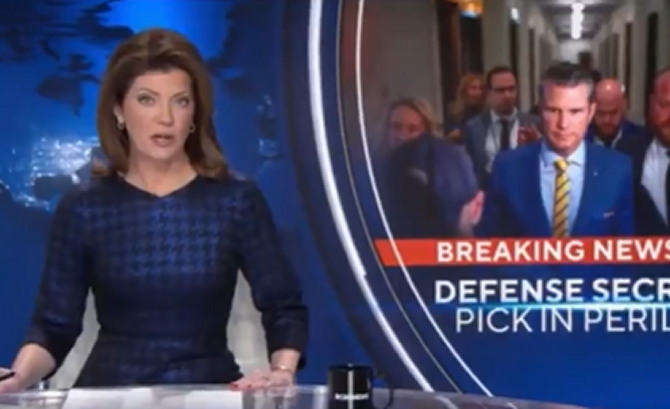In the recent media landscape, allegations against Pete Hegseth, a nominee for the Department of Defense under President Trump, have surfaced, primarily fueled by CBS News and followed by NBC News. This media scrutiny reflects a reminiscent pattern observed during the confirmation hearings of Supreme Court Justice Brett Kavanaugh, where accusations were leveraged to undermine nominees and derail presidential choices. The overarching strategy appears to be a desperate attempt from Democrats and segments of the media to thwart changes voters supported in the ballot box. The narrative suggests that the establishment favors maintaining the status quo and is willing to tarnish reputations to prevent a Trump-led administration from assembling its desired team.
Norah O’Donnell’s coverage of Hegseth’s nomination on CBS Evening News further illustrates this media tactic, bringing forth troubling allegations of sexual misconduct and excessive drinking that could jeopardize Hegseth’s confirmation. This revelation sparks concern over the credibility of these claims, especially in light of the prior tactics employed by media entities and the political left against Trump’s associates. As O’Donnell framed the reports, emphasizing the importance of the nominee’s duty to national security, the undertone persisted that these allegations could undermine public confidence in Hegseth’s suitability for such a critical role.
The Federalist has criticized CBS News for its decline in credibility among the American public. In an era when many citizens are opting to disengage from traditional media sources, CBS has been deemed largely ineffective in maintaining the trust necessary for a respectable reputation. A recent Gallup poll highlighted that less than a third of respondents expressed confidence in media to accurately report events, underscoring a significant disconnection between legacy news outlets and public perception. CBS’s attempts to reclaim its stature as a reliable channel for voter guidance have reportedly backfired, leading to further erosion of faith in journalism.
The issue of media trust is especially pertinent given the political stakes involved. Politically motivated reporting, particularly against individuals associated with Trump, does not only raise questions about the integrity of the media but also poses a challenge to the democratic process itself. As Hegseth’s nomination is put under the microscope, the sensational nature of the accusations and their timing suggest a coordinated effort to sideline Trump’s picks, thereby indicating that media narratives are influenced more by partisan interests than by factual reporting.
Moreover, the interplay between media coverage and public sentiment raises alarms about the potential for misinformation and unfair bias to influence political outcomes. As citizens grapple with a world inundated by information, distinguishing constructed narratives from objective realities becomes increasingly challenging. This complicates the already tumultuous political landscape where media organizations have a powerful role in shaping public opinion and electoral dynamics. With a pervasive narrative that undermines potential nominees through dubious allegations, there exists a risk of fostering a culture of fear among public servants who may hesitate to pursue or accept positions due to the fear of unfounded accusations.
In conclusion, the situation surrounding Pete Hegseth’s nomination embodies the broader challenges legacy media faces in an evolving democratic society. The aggressive tactics seen in his portrayal mirror past experiences where the media intertwined with political aims to undermine opposition. As trust in media continues to erode, the critical question remains: how will citizens engage with news sources that frequently prioritize sensationalism over fairness and accuracy? The growing disillusionment emphasizes the need for a recalibration of how the media operates, ensuring that the public is provided with reliable information that upholds democratic integrity while fostering informed decision-making. The implications of media behavior not only affect individuals like Hegseth but also reverberate through the electoral system, highlighting an urgent need for accountability and reform within institutions tasked with informing the populace.

